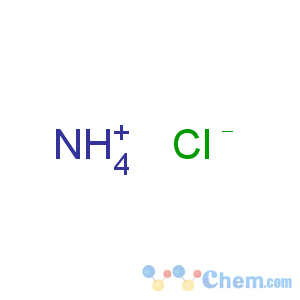Title: Ammonium Chloride
CAS Registry Number: 12125-02-9
Synonyms: Ammonium muriate; sal ammoniac; salmiac
Molecular Formula: ClH4N
Molecular Weight: 53.49
Percent Composition: Cl 66.28%, H 7.54%, N 26.19%
Line Formula: NH4Cl
Literature References: Contains 99.5-99.8% NH4Cl; principal impurity is NaCl; exists in two temperature dependent crystal modifications. Prepn and properties:
Gmelins, Ammonium (8th ed.)
23, pp 150-184 (1936); N. C. R. Kane, "Ammonium Chloride" in
Mellor's Vol. VIII, supplement 1,
Nitrogen (part 1), 378-432 (1964). Manuf: A. W. Bamforth, S. R. S. Sastry,
Chem. Process Eng. 53, 72 (1972). NMR study: K. H. Michel,
Proc. Int. Sch. Phys. 1976, 392. Toxicity data: E. M. Boyd, K. G. W. Seymour,
Exp. Med. Surg. 4, 223 (1946). Brief review: C. W. Weston in
Kirk-Othmer Encyclopedia of Chemical Technology vol 2 (Wiley-Interscience, New York, 4th ed., 1992) pp 695-698. Review of properties and use in water treatment: P. Smeets,
Trib. Eau 570, 26-29 (1994).
Properties: Colorless, odorless crystals or cryst masses; or white, granular powder; cooling, saline taste; somewhat hygroscopic. Tendency to cake. Strongly endothermic. d204 1.5274. Sublimes without melting. Soly in water (w/w): 22.9% (0°); 26.0% (15°); 28.3% (25°); 39.6% (80°). HCl and NaCl decrease soly in water. Sol in methanol, ethanol. Almost insol in acetone, ether, ethyl acetate. pH of aq solns (25°): 1% 5.5; 3% 5.1; 10% 5.0. LD50 in rats (mg/kg): 30 i.m. (Boyd, Seymour). LD50 in rats (mg/kg): 1650 orally (Smeets).
Density: d204 1.5274
Toxicity data: LD50 in rats (mg/kg): 30 i.m. (Boyd, Seymour); LD50 in rats (mg/kg): 1650 orally (Smeets)
CAUTION: Potential symptoms of overexposure to fumes are irritation of eyes, skin, respiratory system; cough, dyspnea, pulmonary sensitization.
See NIOSH Pocket Guide to Chemical Hazards (DHHS/NIOSH 97-140, 1997) p 16.
Use: As a flux in zinc and tin plating; electroplating, electrolytic refining of zinc; etching solutions in manufacture of printed circuit boards; in dry and Leclanché batteries; as a nitrogen source for fertilization of rice and wheat, manufacturing of explosives; flame suppressant; hardener for formaldehyde-based adhesives; mordant for dyes and printing.
Therap-Cat: Acidifier.
Therap-Cat-Vet: Expectorant; diaphoretic; acidifying diuretic.
Keywords: Acidifier.

